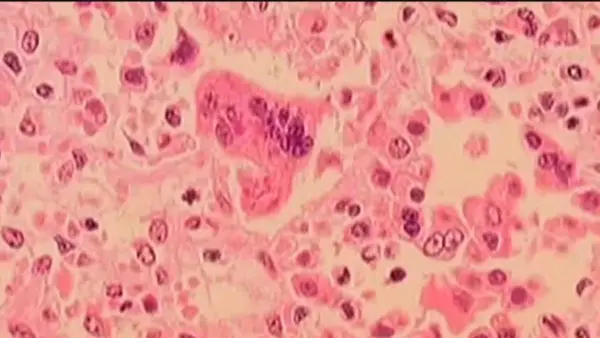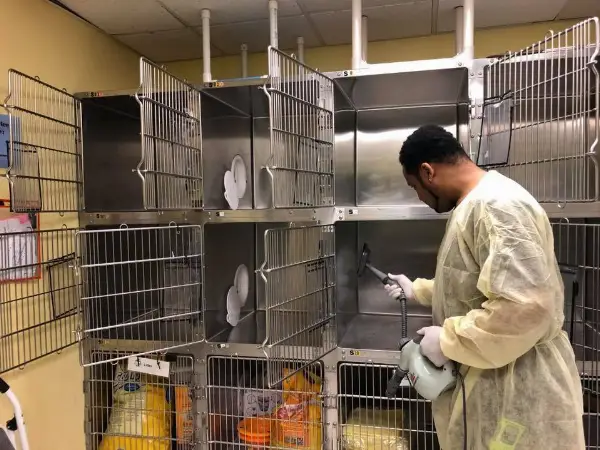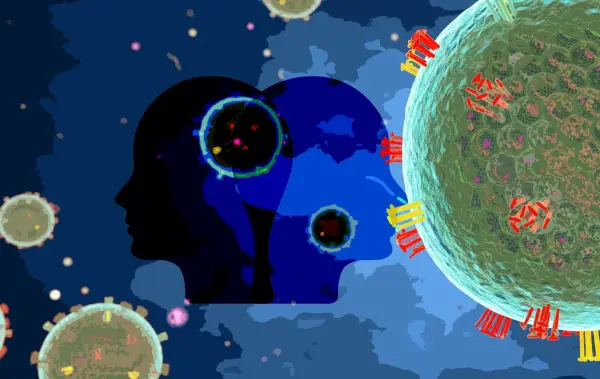Health

Measles Exposure Warning Issued for Boston and Westborough
Massachusetts health officials have issued a warning about potential exposure to measles in Boston and Westborough. A visitor from Texas, who was infected with measles, traveled to the area on December 11 and departed on December 12. Potential exposures may have occurred at Logan Airport Terminal B, the DoubleTree by Hilton Hotel Boston-Westborough, and Logan Airport Terminal C. Symptoms of measles may resemble a cold and can appear one to three weeks after exposure, followed by a skin rash. The risk of infection is low due to the high vaccination rate in Massachusetts, but individuals who are not immune and visited these locations may be at risk. Two doses of the MMR vaccine are 97% effective in preventing measles. Anyone who may have been exposed and develops symptoms is advised to call their healthcare provider before visiting an office or emergency department.

RFK Jr.'s Vaccine Schedule Overhaul Plans May Be Hampered by 80-Year-Old Law
Robert F. Kennedy Jr., the Secretary of the Department of Health and Human Services (HHS), has been seeking to remake the US pediatric immunization schedule. However, his plans may be hindered by the Administrative Procedure Act (APA), a nearly 80-year-old law that requires federal officials to follow an open and deliberative process when issuing rules and regulations. Kennedy had reportedly planned to announce a new vaccine schedule based on Denmark's recommendations, but the announcement was canceled at the last minute. Legal experts say that Kennedy must follow established procedures, including working with the Advisory Committee on Immunization Practices (ACIP), to prevent any policy changes from being dismissed by a judge. The APA requires federal agencies to provide a reasoned explanation for their decisions, and courts can hold agency actions unlawful if they are found to be arbitrary, capricious, or an abuse of discretion. Kennedy's authority as HHS Secretary is not unlimited, and he must justify any changes to the vaccine schedule based on evidence and a deliberative process. The ACIP, which normally formulates vaccine recommendations, would need to be involved in any changes to the schedule. If Kennedy fails to follow the APA, his policy changes could be vulnerable to legal challenges. Numerous lawsuits have been filed against the Trump administration in recent months, claiming that federal agency heads have violated the APA. The American Academy of Pediatrics and other medical groups have criticized Kennedy and the ACIP for recent changes to the vaccination schedule, including removing a recommendation to routinely vaccinate all newborns against hepatitis B. Scientists and public health advocates predict that these changes will allow many children to suffer and die needlessly from vaccine-preventable illnesses. Kennedy can still alter the vaccine schedule, but he must follow a deliberative process and provide a reasoned explanation for his decisions.

New Study Revives Debate on Neutropenic Diet for Cancer Patients
A recent study published in the Journal of Clinical Oncology has sparked a debate about the effectiveness of the neutropenic diet for cancer patients. The diet, which requires food to be cooked to high temperatures to reduce the risk of food-borne illnesses, was thought to be ineffective in preventing infections. However, the new study found that patients who were allowed a less restrictive diet had 11% more infections than those who followed the neutropenic diet. The study, led by hematologist-oncologist John Wingard, involved over 200 blood cancer patients who were randomized to either a liberalized diet or the neutropenic diet. The results showed that the liberalized diet did not improve patients' nutrition or quality of life, and actually increased the risk of infection. The findings have led some physicians to rethink their approach to the neutropenic diet. Talal Hilal, a hematologist oncologist at the Mayo Clinic, stated that the study poses the question of whether doctors should be more liberal with their patients' diets. However, Hilal also noted that there are caveats to the study, including differences in patient populations and hospital practices. The study's results may reignite the debate on the neutropenic diet, with some arguing that it is still a necessary measure to prevent infections in high-risk patients. Others may argue that the diet is too restrictive and does not improve patient outcomes. Ultimately, the study highlights the need for further research on the effectiveness of the neutropenic diet and its impact on patient quality of life and nutrition.

California Experiences Early Flu Season, Doctors Warn of Potential Severity in Young Children
California is facing an early flu season, with concentrations of flu detected in wastewater surging in the San Francisco Bay Area and test positivity rates rising in Los Angeles County and Orange County. Doctors are warning that this season may be particularly tough on young children, with a new viral strain, H3N2 Flu A subclade K, causing an active and early flu season. The California Department of Public Health has noted that subclade K is causing more cases in some countries within the Northern Hemisphere. Hospitalizations and emergency room visits for flu are also rising in L.A. and Orange counties, with flu cases primarily being seen in clinics so far. However, hospitalizations typically rise after Christmas, and doctors expect to see the same pattern this year. The rise of subclade K has led to concerns about the effectiveness of this year's flu vaccine, although data from Britain suggests that the vaccine is 70% to 75% effective against hospitalization for children and 30% to 40% effective in adults. Health experts recommend an annual flu vaccination for everyone older than 6 months, especially as the holiday season nears. However, vaccination rates have been lagging, with an estimated 40.8% of children aged 6 months to 17 years vaccinated as of the first week of December. The decline in flu vaccinations has been seen locally, with fewer influenza vaccines administered this year compared to the same period last year. Doctors urge everybody to get the flu vaccine, as it still offers excellent protection against hospitalization and death, even with the mutated strain in circulation.

Rabies Case Confirmed in Chicago Dog, First in Cook County in 61 Years
A dog in Chicago has tested positive for rabies, marking the first reported case in Cook County in at least 61 years. The Illinois Department of Public Health announced the case, which involves a dog less than a year old that was adopted from a local rescue. The dog had been vaccinated for rabies in June but may have been exposed to the virus before vaccination. The dog exhibited behavioral issues such as growling, snapping, and increased barking, and bit a person on December 11. Its behavior worsened on December 16, and it was euthanized two days later. Two tests confirmed the dog was positive for rabies. Public health officials are investigating the strain and source of the rabies and are evaluating people who came into contact with the dog to determine if they need treatment. Cook County animal control officials are also in touch with owners of the dog's littermates. This case is significant, as the last reported case of a rabid dog in the state was in 1994. The health department is taking steps to prevent further spread of the virus and ensure public safety.

US Nears Loss of Measles Elimination Status Amid Record Infections
The United States is approaching a grim milestone as it nears the potential loss of its measles elimination status. With 1,958 confirmed cases as of December 16, this year has seen the worst measles outbreak in over three decades, surpassing the 1,274 cases reported in 2019. The last time case counts reached 2,000 was in 1992. The current outbreak has led to quarantine orders, with over 100 elementary school students in Spartanburg County, South Carolina, affected. The outbreak in Spartanburg County has resulted in 144 infections and 224 people in quarantine, with most transmission occurring in household or school settings. Infections have been almost entirely among unvaccinated individuals, primarily young people between 5 and 17 years old. Nationwide, measles vaccination coverage among kindergarteners is high, at 92.5 percent for the 2024-25 school year. However, the South Carolina outbreak has followed a pattern similar to other US outbreaks, taking hold in communities with concentrations of unvaccinated or undervaccinated individuals. Public health officials warn that the spread of disease is ongoing, and epidemiologists predict the virus will continue to spread in transmission chains possibly linked to the West Texas outbreak that began in January. If the country loses its measles elimination status, it would reflect backsliding in the public health fight against one of the most infectious diseases on earth. The Pan American Health Organization monitors and evaluates the elimination designation for countries in the Americas, including the US. Vaccination is the best way to stem the tide of new and ongoing outbreaks, with two doses of the MMR vaccine being 97 percent effective at preventing the disease. Public health officials and doctors continue to emphasize the importance of vaccination in preventing the spread of measles. The US could experience more than 800,000 measles cases over the next 25 years if current vaccination rates hold constant, but increasing vaccination rates by just 5 percent could reduce cases to fewer than 6,000 over the same period.

Flu Season Surges: Guidance for Holiday Gatherings and Prevention
As the holiday season approaches, flu activity is rising across the US, with roughly 4% of healthcare visits and nearly 10,000 hospitalizations due to influenza in the week ending December 13. Three children have already died from flu-related causes this season. To minimize the risk of transmission, individuals experiencing symptoms should take a flu test as soon as possible, especially those in high-risk groups such as people aged 65 and older, those with chronic medical conditions, and young children. Flu antiviral medications like Tamiflu or Xofluza can help alleviate symptoms and prevent hospitalization, but they work best when started within 48 hours of symptom onset. Individuals who test positive for flu should avoid contact with others for at least 24 hours after their fever has subsided without medication and their symptoms are improving, typically 4-5 days. Wearing a mask can reduce transmission risk, but it's not a guarantee, and individuals with symptoms should still avoid gatherings. Household members can reduce their risk by practicing good hand hygiene and disinfecting common surfaces. Antiviral medications can also be prescribed to prevent infection in high-risk individuals who have been exposed to someone with flu. It's essential to stay in contact with a doctor if symptoms worsen, especially for those in high-risk groups, and to seek medical attention if experiencing severe symptoms like difficulty breathing or high fever. While it's late in the season, it's still not too late to get a flu shot, which can help prevent serious disease due to three different types of influenza virus. Getting vaccinated is the best way to avoid having the flu disrupt family gatherings during the holidays.